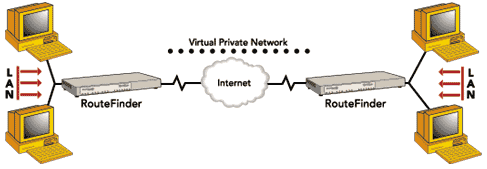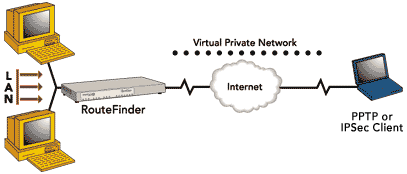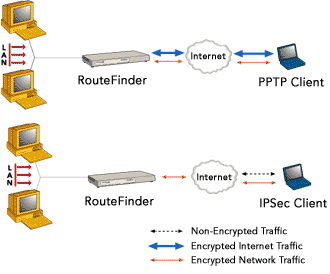 Virtual Private
Networking Solution
Virtual Private
Networking Solution
With
the advent of affordable broadband technologies, small- and medium-sized
businesses can now use the Internet and Virtual Private Networking
to bypass expensive, traditional WAN and remote access connections.
With  VPN solution
a company can tap into the benefits of remote access without the
high cost and complex technical infrastructure.
VPN solution
a company can tap into the benefits of remote access without the
high cost and complex technical infrastructure.

Branch
Office VPN
(Replaces traditional Wide Area Networking)
The LAN-to-LAN VPN application sends network traffic over the
branch office Internet connection, instead of relying on dedicated
leased line connections. This can save thousands of dollars in
line costs and reduce overall hardware and management expenses.


Remote
User VPN
(Replaces traditional remote access)
The client-to-LAN VPN application sends remote user traffic over
the user's Internet connection. The advantage is that the remote
user can make a local call to an Internet Service Provider, as
opposed to a long distance call to the corporate remote access
server. This solution is ideal for a telecommuter or mobile sales
people.

As
you can see, the  client-to-LAN
application supports both IPSec and PPTP. The first, IPSec, provides
strong 168-bit 3DES encryption. It offers high performance 3DES
throughput at 15M bps and supports up to 256 tunnels. When using
IPSec, you need to purchase a client license for each user. We
offer IPSec licenses from 1 to 50 users. PPTP is built into the
Windows operating system (Win 95 and above) provides 40-bit or
128-bit encryption with 8M bps throughput. It utilizes user name
and password authentication and supports up to 128 tunnels.
client-to-LAN
application supports both IPSec and PPTP. The first, IPSec, provides
strong 168-bit 3DES encryption. It offers high performance 3DES
throughput at 15M bps and supports up to 256 tunnels. When using
IPSec, you need to purchase a client license for each user. We
offer IPSec licenses from 1 to 50 users. PPTP is built into the
Windows operating system (Win 95 and above) provides 40-bit or
128-bit encryption with 8M bps throughput. It utilizes user name
and password authentication and supports up to 128 tunnels.
IPSec
vs. PPTP
IPSec, in addition to providing stronger encryption and better
overall security, offers better performance than PPTP.

The
first graphic shows the traffic flow of a remote user using the
PPTP client built into Windows while the second shows the traffic
flow of a road warrior using  IPSec
client. As you can see, PPTP encrypts all traffic coming from
the road warrior and sends it to the RouteFinder. This results
in slower performance and provides an extra load on your data
line at the corporate site.
IPSec
client. As you can see, PPTP encrypts all traffic coming from
the road warrior and sends it to the RouteFinder. This results
in slower performance and provides an extra load on your data
line at the corporate site.
IPSec, on the otherhand, is a more intelligent protocol and only
encrypts the traffic destined for the corporate LAN. Because there
is no need to, Internet traffic is not encrypted, which results
in better overall performance. In addition, it eliminates any
extra load placed on your data line at the corporate site.






